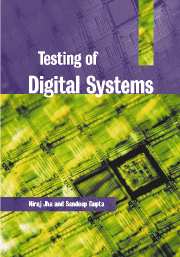Book contents
- Frontmatter
- Contents
- Preface
- List of gate symbols
- 1 Introduction
- 2 Fault models
- 3 Combinational logic and fault simulation
- 4 Test generation for combinational circuits
- 5 Sequential ATPG
- 6 IDDQ testing
- 7 Functional testing
- 8 Delay fault testing
- 9 CMOS testing
- 10 Fault diagnosis
- 11 Design for testability
- 12 Built-in self-test
- 13 Synthesis for testability
- 14 Memory testing
- 15 High-level test synthesis
- 16 System-on-a-chip test synthesis
- Index
14 - Memory testing
Published online by Cambridge University Press: 05 June 2012
- Frontmatter
- Contents
- Preface
- List of gate symbols
- 1 Introduction
- 2 Fault models
- 3 Combinational logic and fault simulation
- 4 Test generation for combinational circuits
- 5 Sequential ATPG
- 6 IDDQ testing
- 7 Functional testing
- 8 Delay fault testing
- 9 CMOS testing
- 10 Fault diagnosis
- 11 Design for testability
- 12 Built-in self-test
- 13 Synthesis for testability
- 14 Memory testing
- 15 High-level test synthesis
- 16 System-on-a-chip test synthesis
- Index
Summary
A modern workstation may have as much as 256 Mbytes of DRAM memory. In terms of equivalent transistors (assuming one transistor per bit) this amounts to 2 × 109 transistors which is about two orders of magnitude more than the number of transistors used in the rest of the system. Given the importance of system test, memory testing is, therefore, very important.
We start this chapter with a motivation for efficient memory tests, based on the allowable test cost as a function of the number of bits per chip. Thereafter, we give a model of a memory chip, consisting of a functional model and an electrical model.
Because of the nature of memories, which is very different from combinational logic, we define a new set of functional faults (of which the stuck-at faults are a subset) for the different blocks of the functional model.
We describe a set of four traditional tests, which have been used extensively in the past, together with their fault coverage. We next describe march tests, which are more efficient than the traditional tests, together with proofs for completeness and irredundancy.
Finally, we introduce the concept of pseudo-random memory tests, which are well suited for built-in self-test (BIST), together with a computation of the test length as a function of the escape probability.
Motivation for testing memories
Ongoing developments in semiconductor memories result in a continually increasing density of memory chips (Inoue et al., 1993).
- Type
- Chapter
- Information
- Testing of Digital Systems , pp. 845 - 892Publisher: Cambridge University PressPrint publication year: 2003



